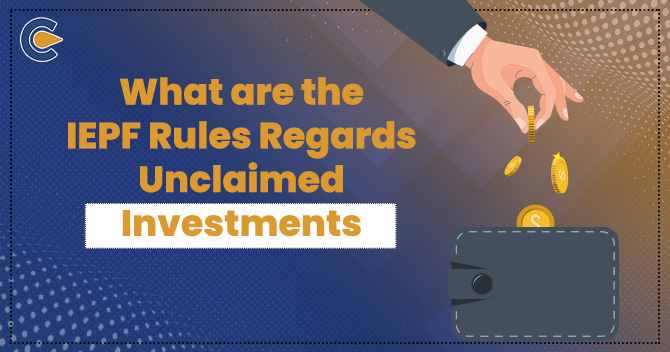Investor Education and Protection Fund (IEPF) promote investors’ awareness and protect their interests. IEPF Rules are made for unclaimed investments that a company retains for seven years for payment to investors and, after the expiry of these seven years, transfer the same to IEPF.
IEPF Rules: Unpaid and Unclaimed Amounts lying with Companies
The Central Government has made Investor Education and Protection Fund[1] (Uploading of information regarding unpaid and unclaimed amounts lying with companies) Rules, 2012, which came into existence on 20th May 2012. Central Government made these IEPF Rules in the exercise of powers conferred by Section 642 of the Companies Act, 1956. This includes the following information:
Filing of Information about unpaid and unclaimed amounts
Companies, including Non-banking Financial Companies and Residuary Non-Banking Companies, hold an Annual General Meeting and, within 90 days of such meeting till completion of seven years, identify unclaimed investments, then separately furnish and upload them on its website as well as on the Ministry’s website or any other Government specified website a statement or information through a prescribed eForm 5 INV for each year separately. The information it contains is as follows:
- Names and address (last known) of the person entitled to receive the amount
- Nature of the amount
- Details of the amount to which each person is entitled
- The due date for transfer into IEPF
- Other relevant information for the purpose
Verification of eForm
Information that is provided by the Companies and Non-Banking Financial Institutions/Companies in eForm 5 INV are duly verified and certified by a Chartered Accountant (CA), a Company Secretary (CS), and a Cost Accountant practising in India or Statutory Auditors of the Company.
Default in filing information
If a Company or Non-Banking Financial Company fails to furnish and upload information or furnishes and uploads false information on its website, then the Company and every officer at fault are held liable. Section 629A of the Companies Act, 1956 is applicable in that case, which talks about the Penalties in a case where no specific penalty is provided in the Act. Section 629A states that the Company or the person at default has to pay a fine which may extend to five hundred Rupees. In case of continuity of such default, a further fine may extend to fifty rupees every day after the first contravention/default continues.
Essentials of Form 5 INV
The Essential Particulars of Form 5 INV under IEPF Rules are as follows:
- CIN (Corporate Identity Number) of Company
- GLN (Global Location Number) of Company
- Name of Company
- Address of registered office of the Company
- Email ID of Company
- Financial Year ended
- Date of Annual General Meeting (AGM) or Due Date, whichever is earlier
- Status of registration with Reserve Bank of India (RBI)
- Number of small shareholders of Company
- Details of Unclaimed and Unpaid Amounts
- Amount of Unclaimed and Unpaid Dividend
- Amount of application money received and due for refund
- Amount of matured deposits
- Amount of matured debentures
- Interest accrued on the amounts mentioned above
- Verification
- Signature of Managing Director, Director, Manager or Secretary of Company (with Designation)
IEPF Rules: Awareness and Protection of Investors
The Investor Education and Protection Fund (awareness and protection of investors) Rules, 2001 talks about the amount to be credited by companies to the Fund (IEPF). Every Company, after crediting the account of the Fund, furnishes a statement in Form duly certified by a Chartered Accountant (CA), a Company Secretary (CS), a Cost Accountant practising in India or Statutory Auditors of the Company to the concerned Registrar of Company. However, each Company keeps a record relating to folio number, Certificate Number, etc. in respect of the person to whom the amount of unpaid or unclaimed dividend, application money, matured deposit or debentures, interest accrued or payable, for a period of three years and the Committee or Sub-Committee have powers to inspect all such records of that period.
This IEPF Rules has also mentioned the list of Unclaimed investments, which is as follows:
- Unpaid and Unclaimed Dividends
- Unpaid application money received by the Company for allotment of securities and due for refund
- Unpaid Matured Deposit
- Unpaid Matured Debentures
- Interest accrued on all of them
Conclusion
Investor Education and Protection Fund (IEPF) protects the interest of investors. In IEPF Rules are made under the Companies Act, 1956/2013. These Rules discuss all the required procedures and other relevant information related to the unclaimed investments.
Read our Article:What is Unclaimed Dividend: How to Claim it from IEPF?











